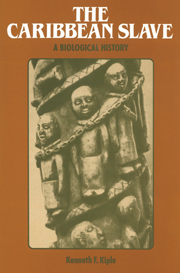Book contents
- Frontmatter
- Contents
- List of Tables
- Preface
- Acknowledgments
- Part I Background and Biology
- Part II Diet, Disease, and Demography
- Introduction
- 4 The Middle Passage and Malnutrition
- 5 Plantation Nutrition
- 6 Malnutrition: Morbidity and Mortality
- 7 Slave Demography
- 8 Slave Infant and Child Mortality
- 9 Black Diseases and White Medicine
- Part III Pathogens and Politics
- Notes
- Bibliographic Essay
- Index
Introduction
Published online by Cambridge University Press: 19 October 2009
- Frontmatter
- Contents
- List of Tables
- Preface
- Acknowledgments
- Part I Background and Biology
- Part II Diet, Disease, and Demography
- Introduction
- 4 The Middle Passage and Malnutrition
- 5 Plantation Nutrition
- 6 Malnutrition: Morbidity and Mortality
- 7 Slave Demography
- 8 Slave Infant and Child Mortality
- 9 Black Diseases and White Medicine
- Part III Pathogens and Politics
- Notes
- Bibliographic Essay
- Index
Summary
Reproduction is a fundamental nutritional task of women.
United Nations (1977)Part I explored some of the West Africans' evolutionary odyssey. Part II takes up their second odyssey in the West Indies. The first and second odysseys were inextricably linked for, as we noted, the immunological experience gained in the first was pivotal in bringing about the second. Yet crucial in determining that enormous numbers would make that odyssey was the failure of the slaves to perpetuate their numbers in the West Indies.
It is true that there was enormous wastage of black lives during life in the West African barracoons and during the middle passage; Chapter 4 examines the causes of many of these deaths during this transitional period between enslavement and plantation labor. It is also true that plantation labor was not structured with the longevity of the slave uppermost in mind. But the thrust of Part II is that the most significant wastage of black lives, and the major reason for their failure to increase their numbers in the West Indies during slavery, was an incredibly high rate of infant and child mortality, as the weeding out process that we witnessed in West Africa continued in the West Indies.
That such a process was perpetuated in the Caribbean is unfortunate, but not surprising, because the West Indies became practically a duplicate of the West African disease and nutritional environment. One says practically, for it was not completely a duplicate. The tsetse fly, for example, did not take up New World residence and consequently was not on hand to discourage the production of animal protein.
- Type
- Chapter
- Information
- The Caribbean SlaveA Biological History, pp. 53 - 56Publisher: Cambridge University PressPrint publication year: 1985



